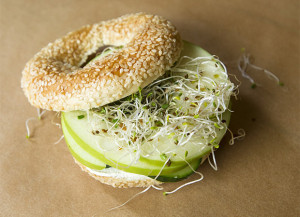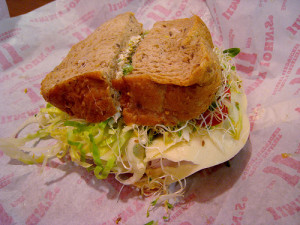Lee Schafer of the Star Tribune wrote in mid-Oct (yes, I’m playing catch-up, taxes and hockey and pumpkins are a bitch) about an announcement of a proposed class-action settlement to readers who somehow suspect they got cheated out of some alfalfa sprouts by the sandwich shop Jimmy John’s.
 In the case of Starks v. Jimmy John’s LLC et al., filed in Los Angeles Superior Court, a customer claimed that Jimmy John’s did not put alfalfa sprouts on her sandwich. The notice of proposed settlement said “sandwiches,” plural, so that suggests it happened to her more than once.
In the case of Starks v. Jimmy John’s LLC et al., filed in Los Angeles Superior Court, a customer claimed that Jimmy John’s did not put alfalfa sprouts on her sandwich. The notice of proposed settlement said “sandwiches,” plural, so that suggests it happened to her more than once.
Since alfalfa sprouts were advertised on the menu, there was a problem.
In a subsequent court filing, the customer alleged interference with contract, intentional misrepresentation, negligent misrepresentation, fraud, violation of California’s False Advertising Act and so on.
Jimmy John’s has agreed to “cease and desist from advertising or otherwise representing” to sell sandwiches with sprouts and then not put them on the sandwich, and it agreed make a charitable donation of at least $100,000.
The vouchers issued to customers can only add up to a maximum of $725,000, less the actual costs of the settlement administration, which are estimated at $15,000.
So, if you ordered a sandwich with sprouts from February 2012 through July 21, 2014, and didn’t get sprouts, then you may fill out a form, send it in and get the $1.40.
 The lead plaintiff is to get $5,000 in addition to her $1.40 voucher. The plaintiffs’ attorneys are to receive $370,000 in fees and expenses. That’s cash, incidentally, not 264,286 vouchers for a pickle or chips at Jimmy John’s.
The lead plaintiff is to get $5,000 in addition to her $1.40 voucher. The plaintiffs’ attorneys are to receive $370,000 in fees and expenses. That’s cash, incidentally, not 264,286 vouchers for a pickle or chips at Jimmy John’s.
Meanwhile, business was brisk Friday at a Jimmy John’s in downtown Minneapolis. There were several sandwiches like the Totally Tuna and Turkey Tom listed with “sprouts* optional” with the asterisk leading to a menu warning that eating raw or undercooked sprouts poses a health risk.
Jimmy John’s has become the poster child for raw sprouts in the U.S. with numerous outbreaks; WalMart and Kroger no longer sell raw sprouts; much of food service stopped years ago.
We document at least 55 sprout-associated outbreaks occurring worldwide affecting a total of 15,233 people since 1988. A comprehensive table of sprout-related outbreaks can be found at https://barfblog.com/wp-content/uploads/2014/08/Sprout-associated-outbreaks-8-1-14.xlsx.
Sprouts present a unique food safety challenge compared to other fresh produce, as the sprouting process provides optimal conditions for the growth and proliferation of pathogenic bacteria. The sprout industry, regulatory agencies, and the academic community have been collaborating to improve the microbiological safety of raw sprouts, including the implementation of Good Manufacturing Practices (GMP), establishing guidelines for safe sprout production, and chemical disinfection of seed prior to sprouting. However, guidelines and best practices are only as good as their implementation. The consumption of raw sprouts is considered high-risk, especially for young, elderly and immuno-compromised persons.
From November 2010 into 2011, an outbreak linked to raw sprouts in the U.S. and involving sandwich franchise Jimmy John’s sickened 140 people. This was the third sprout related outbreak involving this franchise, yet the owner of the Montana Jimmy John’s outlet, Dan Stevens, expressed confidence in his sprouts claiming that because the sprouts were locally grown they would not be contaminated. By the end of December 2010 a sprout supplier, Tiny Greens Farm, was implicated in the outbreak. Jimmy John’s owner, John Liautaud, responded by stating the sandwich chain would replace alfalfa sprouts with clover sprouts since they were allegedly easier to clean. However, a week earlier a separate outbreak had been identified in Washington and Oregon in which eight people were infected with Salmonella after eating sandwiches containing clover sprouts from a Jimmy John’s restaurant. This retailer was apparently not aware of the risks associated with sprouts, or even outbreaks associated with his franchisees.
 In late December, 2011, less than one year after making the switch to clover sprouts, Jimmy John’s was linked to another sprout related outbreak, this time it was E.coli O26 in clover sprouts. In February 2012, sandwich franchise Jimmy John’s announced they were permanently removing raw clover sprouts from their menus. As of April 2012, the outbreak had affected 29 people across 11 states. Founder and chief executive, John Liautaud, attempted to appease upset customers through Facebook stating, “a lot of folks dig my sprouts, but I will only serve the best of the best. Sprouts were inconsistent and inconsistency does not equal the best.” He also informed them the franchise was testing snow pea shoots in a Campaign, Illinois store, although there is no mention regarding the “consistency” or safety of this choice.
In late December, 2011, less than one year after making the switch to clover sprouts, Jimmy John’s was linked to another sprout related outbreak, this time it was E.coli O26 in clover sprouts. In February 2012, sandwich franchise Jimmy John’s announced they were permanently removing raw clover sprouts from their menus. As of April 2012, the outbreak had affected 29 people across 11 states. Founder and chief executive, John Liautaud, attempted to appease upset customers through Facebook stating, “a lot of folks dig my sprouts, but I will only serve the best of the best. Sprouts were inconsistent and inconsistency does not equal the best.” He also informed them the franchise was testing snow pea shoots in a Campaign, Illinois store, although there is no mention regarding the “consistency” or safety of this choice.
Despite the frequent need for sprout-based risk communication, messaging with industry and public stakeholders has been limited in effectiveness. In spite of widespread media coverage of sprout-related outbreaks, improved production guidelines, and public health enforcement actions, awareness of risk remains low. Producers, food service and government agencies need to provide consistent, evidence-based messages and, more importantly, actions. Information regarding sprout-related risks and food safety concerns should be available and accurately presented to producers, retailers and consumers in a manner that relies on scientific data and clear communications.
The would-be food safety gurus at Kansas State still order Jimmy John’s with sprouts for their various really important meetings.
Erdozain, M.S., Allen, K.J., Morley, K.A. and Powell, D.A. 2012. Failures in sprouts-related risk communication. Food Control. 10.1016/j.foodcont.2012.08.022
http://www.sciencedirect.com/science/article/pii/S0956713512004707?v=s5
Abstract
Nutritional and perceived health benefits have contributed to the increasing popularity of raw sprouted seed products. In the past two decades, sprouted seeds have been arecurring food safety concern, with at least 55 documented foodborne outbreaks affecting more than 15,000 people. A compilation of selected publications was used to yield an analysis of the evolving safety and risk communication related to raw sprouts, including microbiological safety, efforts to improve production practices, and effectiveness of communication prior to, during, and after sprout-related outbreaks. Scientific investigation and media coverage of sprout-related outbreaks has led to improved production guidelines and public health enforcement actions, yet continued outbreaks call into question the effectiveness of risk management strategies and producer compliance. Raw sprouts remain a high-risk product and avoidance or thorough cooking are the only ways that consumers can reduce risk; even thorough cooking messages fail to acknowledge the risk of cross-contamination. Risk communication messages have been inconsistent over time with Canadian and U.S. governments finally aligning their messages in the past five years, telling consumers to avoid sprouts. Yet consumer and industry awareness of risk remains low. To minimize health risks linked to the consumption of sprout products, local and national public health agencies, restaurants, retailers and producers need validated, consistent and repeated risk messaging through a variety of sources.
